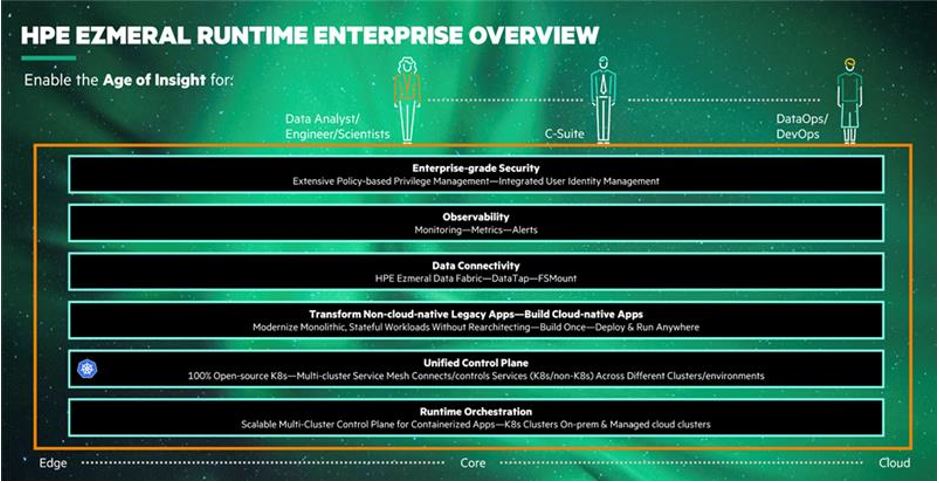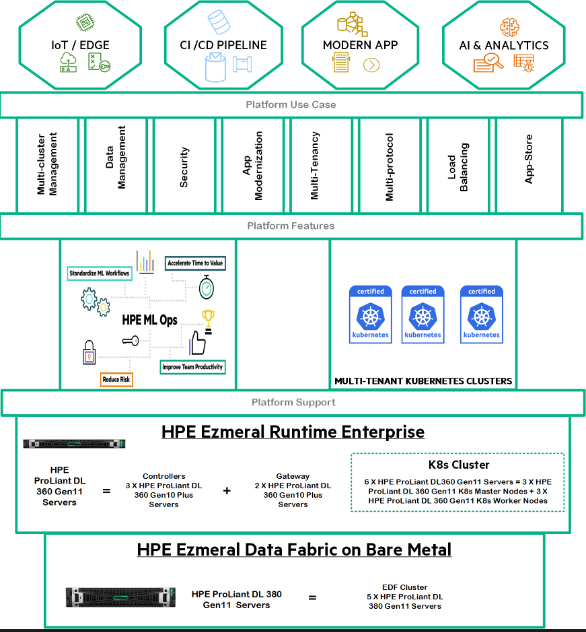# Solution overview
This solution is built by deploying the HPE Ezmeral Runtime Enterprise of HPE ProLiant DL360 and DL380 Gen 11 Servers with multiple local disks setup for Ephermeral and persistent storage. HPE Ezmeral Data Fabric for Kubernetes provides persistent storage for this solution.

Figure 2. HPE Ezmeral software portfolio overview
# HPE Ezmeral RUNTIME ENTERPRISE 5.6.x Overview
The HPE Ezmeral Runtime Enterprise is a unified container platform built and designed for both cloud-native applications and stateful analytics applications running on any infrastructure either on-premises, in public clouds, in a hybrid model, or at the edge.
HPE Ezmeral Runtime Enterprise installs as a software layer between the underlying server infrastructure and the Big Data distribution, AI/ML libraries, and applications. The use of Docker is completely transparent and HPE Ezmeral Runtime Enterprise customers benefit from the greater agility and bare metal performance due to the light-weight nature of the containers. Customers can leverage the flexibility of the containers to simplify development for DevOps, CI/CD pipelines, and application modernization across hybrid cloud deployments.
The HPE Ezmeral portfolio allows you to:
Run containers and Kubernetes at scale to modernize apps, from edge to cloud
Manage your apps, data, and ops – leveraging AI and analytics for faster time-to-insights
Ensure control for governance, compliance, and lower costs
Provide enterprise-grade security and authentication to reduce risk
HPE Ezmeral Runtime Enterprise 5.6.x includes the following new features:
 Figure 3. HPE Ezmeral Runtime Enterprise 5.6.x What’s New
Figure 3. HPE Ezmeral Runtime Enterprise 5.6.x What’s New
OS Support:
- HPE Ezmeral Runtime Enterprise 5.6.x adds support for SLES 15 SP3.
Kubernetes Distribution and Version Support:
- Beginning with HPE Ezmeral Runtime Enterprise 5.6.x, Hewlett Packard Enterprise provides a CNCF-certified distribution of Kubernetes. The suffix -hpe-number labels the Hewlett Packard Enterprise distributions of Kubernetes.
- The Kubernetes versions that were released with HPE Ezmeral Runtime Enterprise 5.6.x include the following:
- 1.22.15-hpe3
- 1.23.14-hpe2
- 1.24.8-hpe2
- With the introduction of Kubernetes bundles, later versions of Kubernetes can be added to compatible releases of HPE Ezmeral Runtime Enterprise. For information about supported versions of Kubernetes and Kubernetes bundles, see Support Matrixes (opens new window).
- For deployments that are upgraded to 5.6.x versions of HPE Ezmeral Runtime Enterprise, existing Kubernetes clusters with compatible Kubernetes versions are permitted for a limited time, but must be migrated to a Hewlett Packard Enterprise distribution of Kubernetes manually. For more information, contact Hewlett Packard Enterprise Support.
Updated Versions of Open Source Components:
- HPE Ezmeral Runtime Enterprise 5.6.x supports the latest versions of open-source components, For more information about supported add-ons, see Support Matrixes (opens new window).
HPE Ezmeral Data Fabric on Bare Metal Support:
- HPE Ezmeral Runtime Enterprise 5.6.x provides enhanced support for registering HPE Ezmeral Data Fabric on Bare Metal as tenant storage as follows:
- Adding support for registering HPE Ezmeral Data Fabric on Bare Metal 7.2 as tenant storage. Registering HPE Ezmeral Data Fabric on Bare Metal 7.2 as tenant storage continues to be supported.
- Simplifying the registration process.
- Adding support for registering the same HPE Ezmeral Data Fabric on Bare Metal instance as tenant storage for multiple deployments of HPE Ezmeral Runtime Enterprise.
HPE Ezmeral Data Fabric on Kubernetes in Non-Production Environments only:
- HPE Ezmeral Data Fabric on Kubernetes is an implementation of HPE Ezmeral Data Fabric cluster.
- Beginning with HPE Ezmeral Runtime Enterprise 5.6.x, HPE Ezmeral Data Fabric on Kubernetes is available for use in non-production deployments of HPE Ezmeral Runtime Enterprise, but it is not supported for production environments.
Embedded Data Fabric is discontinued:
- Embedded Data Fabric is an implementation of HPE Ezmeral Data Fabric that is locally embedded and runs on HPE Ezmeral Runtime Enterprise hosts.
- Embedded Data Fabric is not supported on 5.6.x and later versions of HPE Ezmeral Runtime Enterprise.
- Hewlett Packard Enterprise recommends migrating pre-5.6.x deployments of Embedded Data Fabric to HPE Ezmeral Data Fabric on Bare Metal for production or non-production use cases. Alternatively, HPE Ezmeral Data Fabric on Kubernetes can also be considered for non-production use cases only.
HPE Ezmeral ML Ops Enhancements:
- HPE Ezmeral Runtime Enterprise 5.6.x includes the following enhancements and changes to the HPE Ezmeral ML Ops features:
- Enhanced user Experience - Users can now view detailed information about deployed models through the HPE Ezmeral Runtime Enterprise UI.
Support for Apache Spark 3.2 compatible with HPE Ezmeral Data Fabric on Bare Metal 7.2:
- Includes secure access to read and write data from HPE Ezmeral Data Fabric based on the user identity.
Kubernetes Component Upgrades Without Platform Software Upgrades
- Beginning with HPE Ezmeral Runtime Enterprise 5.6.x release, Kubernetes bundles enable Platform Administrators to upgrade the following Kubernetes-related components without being required to upgrade the HPE Ezmeral Runtime Enterprise platform software:
- The versions of Kubernetes that are available on the deployment.
- The versions of Kubernetes add-on components.
- The following processes are not changed:
- There is no change in the upgrade procedure of an existing Kubernetes cluster.
- If the Kubernetes version update depends on changes to the HPE Ezmeral Runtime Enterprise software, the Platform Administrator must upgrade HPE Ezmeral Runtime Enterprise software to a compatible version.
- Beginning with HPE Ezmeral Runtime Enterprise 5.6.x release Kubernetes bundles package the software to support newer Kubernetes versions, updated add-ons, and software fixes. For more information about Kubernetes bundles, see Kubernetes Bundles (opens new window).
UI Changes for Platform Administration Tasks
- Beginning with HPE Ezmeral Runtime Enterprise 5.6.x, UI screens that are used for platform administration have been consolidated and are grouped in the Global Settings section of the main menu:
- The Controllers/Upgrade screen is now the Controllers & HA screen. From the Controllers & HA screen, Platform Administrators can enable Platform High Availability (HA) and add the hosts that will become the Shadow Controller and Arbiter to the deployment.
- The System Settings has an Updates tab from which you manage the HPE Ezmeral Runtime Enterprise software and the Kubernetes bundles. Platform Administrators can view information about the installed software and initiate and manage the installation of controller software updates.
- The User Management screen now has a Site Admin tab, from which is for the management of users that have Platform Administrator rights (the Site Admin role).
For more information on HPE Ezmeral Runtime Enterprise 5.6.x new features visit https://docs.containerplatform.hpe.com/56/reference/Whats_New_in_Version.html (opens new window)
# HPE Ezmeral Runtime Enterprise Controller
HPE Ezmeral Runtime Enterprise Controller is installed and configured on 3x HPE ProLiant DL360 Gen 11 Servers with multiple local disks setup as raid for platform-level high availability functionality that protects HPE Ezmeral Runtime Enterprise against the failure of the Controller host. Platform-level high availability requires two designated Ezmeral worker hosts, such as Shadow Controller and Arbiter (for non-production test/dev environments single controller deployment is supported).
# Persistent Storage
Persistent volume for the cluster is available from the native HPE Ezmeral Data Fabric for Kubernetes.
# Gateway load balancer
Gateway server provides a connection to HPE Ezmeral Runtime Enterprise-managed Kubernetes cluster services. All public service endpoints in KubeDirector- managed Kubernetes clusters will be exposed via HPE Ezmeral Runtime Enterprise Gateway re-mapped ports. Redundancy for Gateway hosts is provided by creating two gateway servers.This is done by mapping multiple Gateway host IP addresses to a single hostname. This ensures that there is no single point of failure for the Gateway host.When this is done, either the DNS server or an external load balancer will load-balance requests to the hostname among all the Gateway hosts on a round-robin, least connection, etc basis.
NOTE
HPE Ezmeral Runtime Enterprise Gateway load balancer (LB) nodes are deployed on physical machine.
# HPE External Ezmeral Data Fabric for Kubernetes
HPE EXternal Ezmeral data fabric deployed on 5x HPE ProLiant DL380 Gen11 Servers. The HPE Ezmeral Runtime Enterprise out of the box supports the installation and configuration of the persistent data fabric for AI and analytics and K8s workload. This persistent volume is provided by HPE Ezmeral DataFabric which is a distributed file and object store that manages both structured and unstructured data. It is designed to store data at an Exabyte scale, support trillions of files, and combine analytics and operations into a single platform. It supports industry-standard protocols and APIs, including POSIX, NFS, S3, and HDFS. With production-ready capabilities like policy-based data tiering,consistent snapshots, and mirroring, the persistent data fabric serves as the enterprise standard for meeting stringent storage and processing SLAs across on-premises, hybrid cloud, and edge deployment.
Figure 4 describes the minimal configuration of HPE Ezmeral Runtime Enterprise deployment on HPE ProLiant DL INTEL Gen11 Plus Servers.

Figure 4: HPE Ezmeral Container Platform solution layout on HPE ProLiant DL Gen11 Plus Servers
All applications running in containers will be able to natively access data across the fabric through DataTaps as well as through FSMount. K8s persistent volumes will be seamlessly available across clusters from this persistent data fabric.
In this solution, HPE Ezmeral Runtime Enterprise Controllers, Gateway load balancers, Kubernetes master nodes and Kubernetes worker nodes are deployed on HPE ProLiant DL360 & DL380 Gen11 Plus Servers running SUSE Enterprise Linux 15 SP3.